Kedushat sheminit
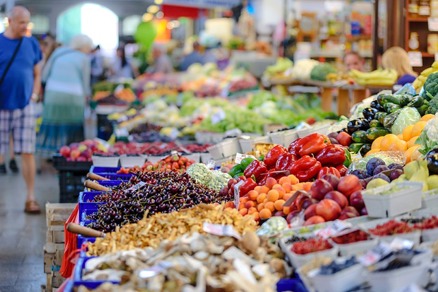
Otzar Ha'aretz—summary of the shemitah year and looking ahead: how we can strengthen our Jewish farmers and buy mehadrin produce also during non-shemitah years. Published in Hebrew in Besheva, Cheshvan 5783.
With the first arrivals of eighth-year produce to grocery stores, Otzar Ha'aretz sums up the shemitah year as a huge success: for farmers, grocery store owners, and of course, for the hundreds of thousands consumers throughout the country who bought Israeli produce only, employing mehadrin halachic shemitah solutions. Now Otzar Ha'aretz is advancing, full steam ahead, towards its newest goal: selling Israeli produce for the next six years.
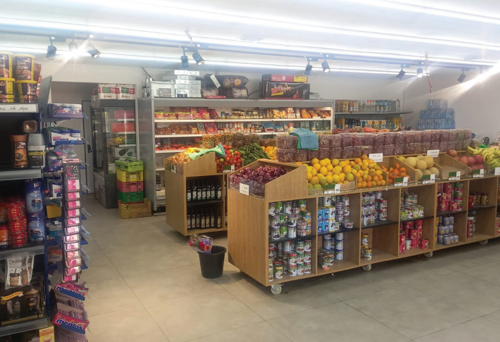
Yosi Oshri // Photo: Otzar Ha'aretz
While the shemitah year is behind us, we will continue to encounter agricultural produce grown during shemitah throughout the year, along with all of its halachic considerations. One of the initiatives most identified with the shemitah year is Otzar Ha'aretz, an initiative of Torah VeHa'aretz Institute, founded 21 years ago following the need for halachic solutions to provide fruits and vegetables during shemitah. The initiative is guided by the important principles of connecting the public to shemitah observance in the Land of Israel, strengthening Jewish agriculture, bringing holy shemitah produce to every Jewish home, and advancing the public towards proper halachic shemitah observance in the State of Israel.
After an especially intense year, now that vegetables are starting to lose their shemitah status, we caught Eitan Meir, CEO of Otzar Ha'aretz, for an interview summing up this past year and looking ahead. "In the first stage, we sold sixth-year produce and immediately after that, vegetables with kedushat shevi'it. In the second and main part of shemitah, the vegetables were from fields in olei Mitzrayim territory. Now, slowly but surely, produce from the eight year is making its way to the market. By now (Cheshvan 5783), bananas have already left their shemitah status, cucumbers and squash are supposed to enter eighth-year status this week, and later on other vegetables. By Chanukah, almost all of the vegetables will no longer belong to the shemitah year," he notes.
The model built in Otzar Ha'aretz benefited farmers, store owners, and of course the customers themselves. "Many farmers who would have shipped their produce directly to a large supermarket chain would, it seems, save on the brokerage prices, would receive less money than what we paid them. Moreover, the customers would pay more for the same product. We really charged only for the expenses. The farmers received what they deserved, as did the store owners, and of course the marketing company, the distribution company Bikurei Sade Darom, and the store owners accepted the beit din price guidelines and everyone was satisfied. The prices (of otzar beit din produce only – Moshe Bloom) were fixed throughout the year, which is very rare, but, thank G-d, it was successful. I believe that it is thanks to this system that farmers enjoyed financial security this year, which is not an easy year since there are sections of the population that completely avoid Israeli produce and opt for imports or yivul nochri –specifically then it is so important that Otzar Ha'aretz steps up to the plate and makes Israeli produce available."
Alongside the vegetables that have gone back to the sixth-year routine, many fruits will continue to have kedushat shevi'it through Pesach. "This is the point where in the past we would leave the stores and everyone would do as they saw fit. This year we are launching a revolution," Meir declares, "in light of the tremendous encouragement from the public, messages, telephone calls, and e-mails all asking for one thing: continue, continue, continue! The topic of Israeli agriculture burns in our bones. We want to care about our farmers not only during the shemitah year. Otzar Ha'aretz provided Israeli produce with kedushat shevi'it and Shabbat observance – all of these are important during the shemitah year. People asked: Wait, do we only need to support Israeli agriculture during shemitah? The answer is a resounding 'No!'
"We care about Israeli agriculture and it is always important to us. Essentially, during the shemitah year the country is always at a crossroads: we can increase imports, since there are populations that demand non-Jewish produce – imports and produce grown by our enemies. This causes Israeli agriculture to disappear, since land is given to non-Jewish farmers and import quotas are increased. The haredi population is growing so store owners are saying: Wait, if I'm already bringing imports, I'll bring even more. That is why during the shemitah year, Israeli agriculture is weakened and dwindles," he adds in frustration.
Supporting Israeli agriculture
"We are coming and saying: we care about Israeli agriculture. We close deals that promise financial security to farmers who want to keep shemitah. We care about Israeli agriculture in its entirety – those who want kedushat shevi'it and those who want a different solution – but we do not go for the solutions of yivul nochri or imports." (Only when the particular type of produce was not available in Israel or there was a temporary shortage, Otzar Ha'aretz would bring small amounts of imports – Moshe Bloom).
In his words, the concept is right after the 5782 shemitah year to launch a revolution and to continue giving a strong push to Israeli agriculture. "We want to continue also in the eighth year, which is actually the first year; and then the second and third years in the shemitah cycle, etc., with Israeli agriculture. This agriculture will provide a livelihood for Jewish populations. We will make sure that there is fair commerce with the farmers; we will not allow for large supermarket chains to undermine their livelihood. We will provide financial security, we will care for the Jewish settlement of the Land of Israel, and of course we will advance Zionism and our stronghold on the soil. To paraphrase Joseph Trumpeldor, "Wherever the plow passes, there will be the border."
"This is what motivates us, maintaining a stronghold. More land and more land and another agreement with a farmer that will give him financial security. That is what we want to continue," adds Meir. "We are currently in contact with two major companies that can provide high-quality, supervised Israeli agriculture without a concern of Shabbat desecration during harvest. We hope to also achieve our next goal: monitored agriculture supervised for pesticide traces. This is another topic that is important to us. People are not aware that when they buy yivul nochri they do not know what type of water is used to water the ground. In Israeli agriculture there is supervision and regulations, the various ministries monitor what goes on.
You are essentially declaring that Otzar Ha'aretz is not ending with the shemitah year, but is continuing on into the eighth year.
"Precisely. Otzar Ha'aretz is not just about shemitah, it's a way of life. We will continue with our clients and with our stores. We will bring in another company that will provide a marketing alternative. We will keep the prices affordable, we will support Israeli agriculture, and we will make sure our brothers can make a living. Our prices will be fair and competitive, the produce will continue to be of the highest quality, just as it was during the shemitah year, but this time with a larger variety of farmers and with more solutions that we can give to the public—to all sectors of the population, not just to one group."
 Photo: Yisrael Goldberg
Photo: Yisrael Goldberg
Eitan Meir, CEO of Otzar Ha'aretz: "Otzar Ha'aretz is not just about shemitah, it's a way of life. We will continue with all of our clients and all the institutions that worked with us during shemitah and we will care for and support Israeli agriculture while providing our brothers with a livelihood. All of this with excellent service and competitive prices.
Kibbutzim prefer blue-and-white
One of the surprising facts that Otzar Ha'aretz discovered over the past year, is that the secular population also prefers blue-and-white agricultural produce. "It is very difficult to send kibbutzim—even those that do not keep kosher—imported produce. They simply do not accept it. If you send a tomato from Turkey to the moshavim in the Golan Heights, they will return it to you. If you send imported produce to kibbutz that is not necessarily religious, they will be returned to sender. These are not only the religious kibbutzim. There is something here that spans all sectors: that we support Israeli produce and prevent imports as much as possible. The country should not only consider the monetary aspect but rather the issue of holding onto the land and standing strong in the face of our enemies – to make sure we don't slide backwards in terms of the land staying in Jewish hands rather how we increase it and strengthen our brothers."
Do you expect that the haredi population, which did not join Otzar Ha'aretz during shemitah because it does not rely on the halachic solutions of Torah VeHa'aretz Institute, will now find it a good option?
"I believe, G-d willing, that this is the next step. First we have to strengthen our standing in the general population. Afterwards, thanks to popular demand—if people go out and demand Otzar Ha'aretz produce in stores, this will help us grow and gain momentum. One of our goals for the coming year is to increase partnerships with supermarket chains and large stores. There are large supermarkets and stores that already work with us. For instance, Maayan 2000 worked with us in some of its branches, but not enough. This is the opportunity to call on supermarket chain owners to join us and strengthen Israeli agriculture, not necessarily during the shemitah year." Regarding membership from the shemitah year, he notes that it is still possible to use membership money from the shemitah year, "but this will not last for more than the next two months. We ask everyone to use their membership money."
Meir has another announcement as well: wine from Otzar Ha'artez. "The wine is produced in partnership with the Pesagot winery. It will be high-quality wine and will be sold at excellent prices (NIS 35 per bottle: Moshe Bloom) due to the shemitah year. The wine will be available, G-d willing, come spring."
We didn't feel shemitah
Also store owners sum up with much satisfaction their partnership with Otzar Ha'aretz over the past year. Yoram Kadosh, the owner of Super Turjeman in Neve Daniel and Elazar for more than a decade, praises the high-quality, service, and quantity. "People didn't feel anything was lacking because of shemitah," he notes with amazement. "We decided to join since our population is shemitah-observant. It worked fantastically, much better than it did last shemitah."
How did the customers react?
"First, the customers were very pleased that they had this option – to keep shemitah with supervision and a mashgiach who comes nearly every day and checks the merchandise and the prices, along with the added value of inexpensive prices. There is also the issue of the coupons. People who were members of Otzar Ha'aretz and they had membership money came to us, so our client base expanded somewhat. In our area, we are almost the only store with Otzar Ha'aretz produce and people came to us from other places to buy mehadrin Israeli shemitah produce."
Besides the economic factor, Kadosh views it as supporting shemitah-observant farmers specifically, and Israeli agriculture as a whole. "We just came out from a meeting with the CEO of Otzar Ha'aretz and we are interested in continuing next year and to encourage Israeli agriculture."
This past year was the fourth time that Effi Sharvit, the owner of Deal Vezol, a supermarket chain with five branches in the Beit Shemesh area, has worked with Otzar Ha'aretz. "When we went into the business 23 years ago, the shemitah year began. It was the first shemitah then, and now it's the fourth. What made me want to start working with them then was the high-quality produce. Otzar Ha'aretz is what the community requested and wanted, so that's what we did. It was great, so we continued with it each shemitah.
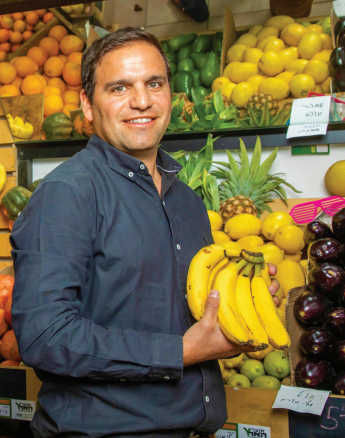
He noted that the customers were satisfied from the supply in the stores. "In some of our stores, the vast majority of customers are religious, knitted yarmulkas, people who believe in ideology together with kashrut. During the shemitah year, besides heter mechirah, whoever wants to eat kosher, local produce – there aren't many options. Otzar Ha'aretz offers this option and also supplies produce that in terms of the laws of shemitah is appropriate for the target population, and is also high-quality produce in relation to that available in the marketplace during the shemitah year."
Sharvit emphasizes that the prices are very attractive in comparison to market prices. "In contrast to other shemitah years, this shemitah there was a major change in the variety of products, in their quality and in how often new produce arrived at stores. Shemitah has many restrictions. But this shemitah year, in relation to others, was much better than previous years." He also notes the extra advantage besides the ideological aspect, which is the quality. "You get a tomato and cucumber you can eat and enjoy because they are watered and cared for like they should, and by a Jew."
Accommodating farmers' needs
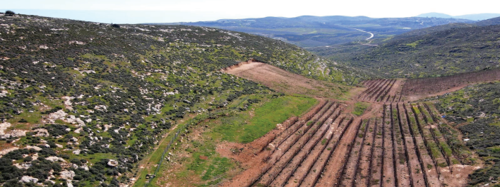
As mentioned earlier, the positive feedback on Otzar Ha'aretz also comes from farmers. Over the past five years, Malachi Idles, has grown table grapes in Moshav Karmei Katif. His land spans 60 dunams, some of which do not yet produce and some are still orlah or neta revay. Until the shemitah year, he sold his produce through merchants in the open market and also through direct sales to customers' homes. When the shemitah year arrived, his options were to shut down operations, sell the land to a non-Jew through heter mechirah, or join an otzar beit din.
Idles decided to go with otzar beit din. "After consulting with the rabbi of our village and other rabbis such as Rabbi Tzvi Rimon, I realized that this was the best way to observe shemitah today. I conducted negotiations with several batei din. Finally, we decided to work with Otzar Ha'aretz since it was more organized. Also in terms of the halachic rulings, it's something that is closer to us. All of the other batei din were from other sectors. Also monetarily, it worked out for us."
"All in all, I am very satisfied," he compliments. "From the start, they treated us well. We saw that they try to accommodate our needs and it was wonderful working with them. It was a very positive experience. They truly tried to accommodate the farmers as much as possible and understood the problems that we face in all of the various areas – from growing and marketing – and they found viable solutions so that all parties involved were satisfied."
Michael Amar, of Kibbutz Alumim, is a veteran farmer working in the field for already 22 years. "I started off operating a tractor transporting carrots. I performed all of the possible jobs – irrigation manager, work manager, crop manager, and I was in charge of all of the agriculture at Kibbutz Alumim." Over the past seven years, he is in charge of marketing the produce from Kibbutz Alumim, which grows primarily root vegetables. "Our biggest crop is potatoes, followed by carrots. Those are the large quantities. We also have some sweet potatoes, small peppers – hot peppers, chili peppers – white cabbage, and red cabbage. Besides that, we also grow peanuts and a bit of wheat."
The year 5782 was the second shemitah when Kibbutz Alumim split up the farm land between heter mechirah and otzar beit din. "We designated plots for otzar beit din so that the army and the majority of religious Zionists won't need imports. By doing so, we take care of the farmers at Alumim and continue to sell mehadrin Israeli produce. Together with the rabbinate and otzar beit din, we set aside plots outside of olei Mitzrayim borders and planted there – some was planted during the sixth year and harvested during the seventh year. The second part was all outside of olei Mitzrayim, and the third part was produce that we kept for the army for a long time. All of this is to ensure that the soldiers need not eat carrots produced in Turkey instead of in Israel. As an Israeli farmer who tries to keep his head above the water and make a profit from farming, it is problematic. We are all just trying to live off of it."
How do you sum up the year working with Otzar Ha'aretz?
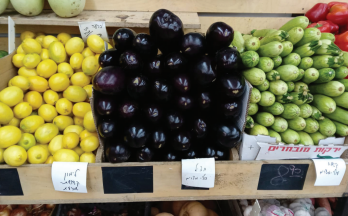
All in all, it went well. They kept to the quantities we agreed on at the beginning. It flowed. We even got along with the kashrut supervisors. I sometimes receive photos from soldiers eating carrots from Kibbutz Alumim. They are satisfied and write, "Thank you!" "Good for you!" and the like. That makes it all worth it. You see all the imports that come in here and it's difficult for us farmers to see. In the end, it hurts us and there are many farmers that have to close down and leave the field. On the left side of the road that I'm driving on right now, it's possible to see many, many abandoned greenhouses. This used to be leader of Israel's tomato crop. Now there are hardly 300 hectares. This is a joke. There used to be unbelievable quantities of tomatoes and peppers! Today it's empty."
Is it all because of imports?
"Totally! Look at how much you pay for a tomato today – you pay even more than what you used to. So it didn't accomplish anything. It simply undermined our food security, harmed the farmers, and even the customers who thought that the price would go down and it even went up. Otzar Ha'aretz entered this vacuum and protected Israeli agriculture, so whoever can and is willing to work within the framework of halachah can continue to eat our produce and not imports from abroad."
Signs of the Redemption
Rabbi Yehuda Amichay (head of Torah VeHa'aretz Institute), who is behind the Otzar Ha'aretz initiative together with the institute's dean, Rabbi Yaakov Ariel shlita"h, expands on the great importance of Israeli agriculture. "Israeli agriculture is not only an economic issue, rather it is one of the signs of the Redemption," he states. "Chazal note, not once, that agriculture in the Land of Israel is a blatant sign of the Redemption. Last week I drove near Lakhish and saw vineyards laden with beautiful bunches of grapes. Also in Holot Halutza, you can see the burgeoning agriculture that continues to grow and develop. Only a few years ago no one dreamt that anything could grow in the sand there. Suddenly the entire area is full of vegetables. This is a rare blessing that wasn't here for years, but now we can see how the Redemption is taking shape."
Furthermore, Rabbi Amichay notes that whoever supports Israeli agriculture is essentially supporting Israel's periphery. "The vast majority of Israel's farmers live and work their fields in the periphery – in the Negev, Galilee, and Golan. Whoever consumes Israeli produce strengthens the Jewish farmer in the Gaza Envelop or the Golan Heights. This constitutes the mitzvah of settling the Land of Israel, since whatever territory is not worked by a Jewish farmer will immediately go to a different farmer who does not help in this mitzvah. Additionally, there is the basic mitzvah of "And your brother shall live with you." When, 120 years ago, the Land of Israel began to be settled and we began working the land, with this we acquired it. What we have achieved today is in the merit of those who worked the land who literally sacrificed their lives for it. Today, too, it is not simple to be a farmer. This is why it is up to us to help Jewish farmers make a livelihood. This process is no less important than it is during shemitah. Now, the year after shemitah, we hope and pray that with Hashem's help we will merit to experience the speedy redemption of the Jewish People."




